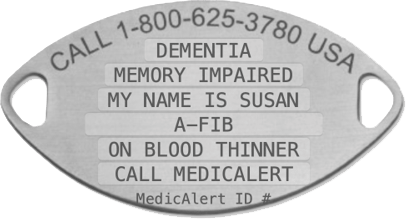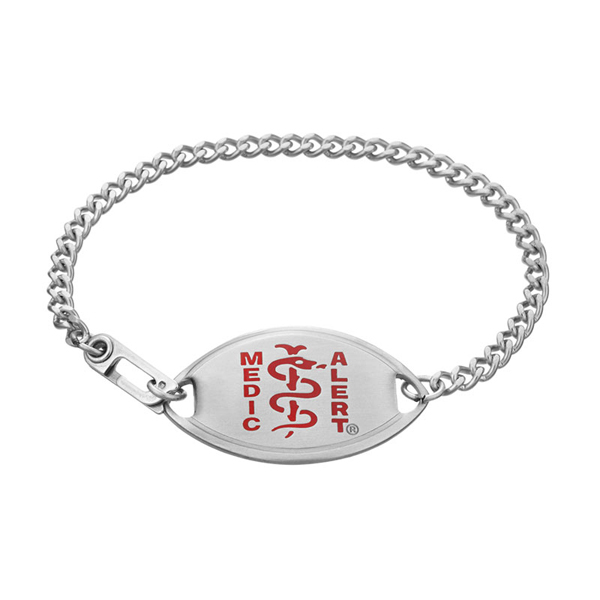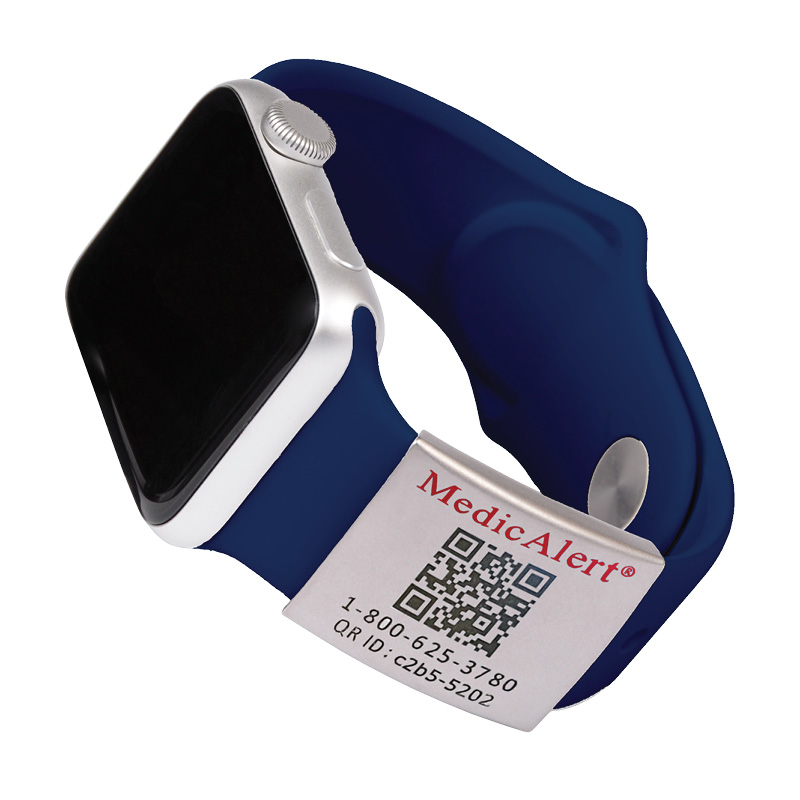
Medical IDs for Alzheimer's
Related Articles: Dementia
More than six million Americans are living with Alzheimer’s—and that number is rapidly growing. A MedicAlert medical ID can be the difference between a safe return home and a dangerous delay during a wandering incident.
The confidence to live with Alzheimer’s
Alzheimer’s is a progressive and incurable neurological disease that affects memory, thinking and behavior. According to our long-time partner, Alzheimer’s Association, there are currently more than six million Americans living with Alzheimer’s, and the number is rapidly growing.
A staggering statistic is that 6 out of 10 people with dementia will wander from safety. When someone with dementia wanders, they’re often unable to tell others where they live or how to contact their caregiver. If they aren’t located within a few hours, the odds of injury or death increase dramatically. That’s why MedicAlert partnered with Alzheimer’s Association to provide Safe and Found services that help improve outcomes in a wandering incident.
We are specialists in wandering safety. With decades of experience, we are specialists in wandering safety—acting quickly to alert authorities, hospitals, and families.
When a MedicAlert member is reported missing, MedicAlert creates and distributes a bulletin to local hospitals and law enforcement, and coordinates with the family to facilitate their loved one’s safe return home. When your loved one wanders and can’t communicate, MedicAlert can be their voice.
QR Code Medical IDs with Location Tracker is perfect for those living with Alzheimer’s – empower your loved one and ensure they are safely returned home if they ever have a wandering incident.
How MedicAlert protects those with Alzheimer’s
Living with Alzheimer’s can be stressful. One thing you shouldn’t worry about is what could happen in an emergency. MedicAlert’s protection plans offer benefits that extend beyond the medical ID for Alzheimer’s, providing safety and peace of mind for people living with Alzheimer’s, their families and caregivers.
Every year, more than 500 people who wandered from a safe environment are located thanks to MedicAlert IDs and the Safe & Found program.

Safe and Found
If your loved one wanders, we’re here 24/7 to help ensure a safe return home.

Emergency Contact Notification
In an emergency, we connect families so that no one is alone in a crisis.

24/7 Emergency Response
Our team provides first responders the information they need to provide fast, accurate care.

Digital Health Profile
All your vital information, all in one place for you and your caregiver.
Pair a medical ID for Alzheimer’s with the protection plan that’s right for you.
What’s the difference between dementia and Alzheimer’s disease?
Dementia is a general term for conditions that have a group of symptoms including memory loss, cognitive decline, and impaired communication. Alzheimer’s is a specific type of dementia, and the most common type – accounting for 60-80% of cases. Alzheimer’s affects memory, language and thought, and gets worse with time. Neither Alzheimer’s nor dementia are part of the normal aging process.
According to the National Institute on Aging, many more people under age 65 also have the disease. Unless a cure or preventative measures can be found, current trends suggest the number of people with Alzheimer’s will increase because advancing age is the most important known risk factor for Alzheimer’s disease.
How does Alzheimer’s disease progress?
Alzheimer’s progression is classified into three states: early, moderate, and severe. People with Alzheimer’s typically experience symptoms in their mid-60’s, but early-onset cases can begin as early as the 30’s. Early Alzheimer’s symptoms can include:
- Memory loss
- Losing or misplacing things
- Difficulty thinking or understanding
- Wandering or getting lost
- Mood and personality changes
- Repeating Questions
As Alzheimer’s progresses, these symptoms worsen and increasingly interfere with daily life, ultimately making it difficult for people with the condition to carry on conversations or respond to their environment.
“
For someone who is at risk of wandering,
MedicAlert is a real lifeline
for them and their families.
Monica Moreno
Senior Director of Care & Support, Alzheimer's Association
What causes Alzheimer’s?
The cause of Alzheimer’s is not fully understood, but scientists believe that it develops from a combination of genetics, lifestyle, and environment.
Alzheimer’s causes brain cells to die and breaks down connections between brain cells. The telltale sign of Alzheimer’s is abnormal protein deposits in the brain called plaques and tangles. However, these can only be seen posthumously in an autopsy of the brain. Still, specialists can diagnose Alzheimer’s with great accuracy by assessing other symptoms.
Increasing age is the largest Alzheimer’s risk factor. Most individuals living with the disease are over age 60, although there are a growing number of people who experience early onset Alzheimer’s.
Common challenges for those living with Alzheimer’s disease
Living with Alzheimer’s is never easy. Those dealing with even earlier symptoms can become overwhelmed, feel out of place, become depressed, or get frustrated dealing with memory loss and life not working the way it once did.
Some of the most common challenges those living with Alzheimer’s tend to face are:
- Memory loss
- Wandering
- Hallucinations
- Loss of energy and spontaneity
- Impaired judgment
- Difficulty with communication and remembering names
- Mood swings
- Delay in reaction times
These challenges to daily life are some of the reasons medical IDs for Alzheimer’s help so much in providing safety and peace of mind for those living with this condition, as well as for their loved ones.
Engraving your MedicAlert ID for Alzheimer's
An Alzheimer’s ID bracelet works best when it is tailored with your custom information and easily readable for anyone who may be trying to help you in a crisis. Important medical and emergency contact information that is available at a first responder’s fingertips will allow them to treat you quickly and effectively.
The best things to engrave on a medical bracelet for Alzheimer's include:
- Alzheimer’s, dementia, or memory impaired
- Name of person wearing ID
- “Call MedicAlert” so our Safe & Found services are activated in a wandering incident
- Any other significant medical conditions, allergies, or medications

Sample engraving. Consult our team if you need help engraving your medical ID for Alzheimer’s.
Find your medical ID.
How MedicAlert protects your loved one if they have a wandering incident
Every year, more than 500 people who wandered from a safe environment are located thanks to MedicAlert IDs and the Safe & Found program.
Implementing strategies to stop wandering is your first step. But even in the safest of situations, wandering still happens. If the person who wandered is not brought to safety in a few hours, the chances of a negative outcome increase dramatically. Equipping a loved one living with Alzheimer’s with a MedicAlert ID and Protection Plan significantly improves their chances for a safe return home. MedicAlert also provides family and caregivers with invaluable peace of mind.
As part of a MedicAlert Protection Plan, the Safe & Found Program is available 24/7 to assist with wandering emergencies. In the event a person with dementia should wander, families and caregivers can activate the support provided by this program by calling and reporting the person missing.
MedicAlert’s team will then:
- Create and distribute missing person flyers to local authorities
- Relay critical medical and identifying information to EMS, police, and local medical facilities so they know to watch for the individual
- Notify the person’s emergency contacts immediately when they are found
If someone who has wandered is found by a first responder or Good Samaritan:
- The finder contacts MedicAlert at our 24/7 emergency response center
- We confirm the member’s identity through the ID number on their bracelet or necklace
- We immediately connect the finder with the member’s emergency contacts to confirm next steps and a safe return home
How to prevent wandering incidents
While it’s not always avoidable, wandering risk can be significantly reduced through proactive planning and layered safety strategies. Here are some best practices:
✅ Daily Structure & Engagement
Maintain a consistent daily routine with meaningful activities.
Identify times when the person is most likely to wander and plan engaging tasks during those windows.
Ensure all basic needs—like toileting, hydration, and nutrition—are met.
Limit liquids two hours before bedtime to reduce nighttime wandering.
Incorporate light exercise to help reduce restlessness and anxiety.
🧠 Environmental Cues & Safety at Home
Include the individual in everyday tasks like folding laundry or meal prep.
Install door locks (deadbolts) out of line of sight—high or low on the door.
Use safety tools like motion alarms, pressure mats, or monitoring devices.
Add signage to doors and rooms for clarity and orientation.
Store triggering items (e.g., keys, coats, wallets) out of sight.
Use night lights to prevent disorientation after dark.
Create safe, enclosed indoor and outdoor spaces for exploration.
🌍 Safety Outside the Home
Avoid busy or overstimulating environments like malls.
Never leave someone with Alzheimer’s unsupervised in unfamiliar settings—or alone in a car.
Monitor how they respond to new surroundings to prevent disorientation.
👥 Support for Early Stages
Establish regular daily check-ins.
Review the day’s schedule together.
Designate a companion if caregivers aren’t nearby.
If driving becomes a concern, explore alternative transportation.
Tip: Always ensure your loved one wears a medical ID, ideally with location tracking and emergency contact access, to help ensure a safe return in case wandering occurs.

MedicAlert Foundation and Alzheimer’s Association are long term collaborators in addressing the wandering crisis.
Most appropriate medical IDs for Alzheimer's, and how to layer protection
When it comes to protecting a loved one with Alzheimer’s, layered identification is essential. The more visible, connected, and accessible their information is, the greater the chance of a safe return in the event of a wandering incident.
You can start with a core medical ID, like a bracelet or necklace, engraved with essential information.
Our Smart ID combines the scannability of a QR code, the power of location tracking via Apple AirTag, and full integration with MedicAlert’s Safe & Found services. It’s a discreet, wearable safety net—making it easier for first responders and Good Samaritans to help quickly and effectively.
While many individuals with Alzheimer’s can comfortably wear medical ID jewelry, non-removable ID options—featuring tamper-resistant clasps—are ideal for those at high risk of removing them.
❓ Do I need a medical ID if my loved one already has a tracking device?
Yes. Tracking alone doesn’t communicate medical conditions or emergency contacts. A MedicAlert ID—especially when combined with tracking—ensures the person can be identified and cared for immediately, not just located.
As technology advances, so do our options. In addition to bracelets and necklaces, MedicAlert offers:
Smart IDs for Apple Watch bands, shoelaces, and wallets
Non-removable IDs for added safety
Custom engraving to personalize each ID to your loved one’s needs
Protection is personal—and multi-layered identification is one of the most effective tools we have in keeping those with Alzheimer’s safe.
Here are some alternative Medical IDs for Alzheimer's:
MedicAlert’s Smart Medical ID Card is credit card-sized and easily carried with you in a wallet or pocket, or slipped into the pocket of a loved one if you’re worried they may wander. MedicAlert ICE Tags come in a set of four durable vinyl stickers that adhere securely to any hard surface – think cellphone cases, mobility aids – typical objects that travel with you.
The portability and scope of personal medical information they provide make Smart IDs a great alternative (or addition) to traditional jewelry and wearable IDs. They’re useful in emergency situations, but also for doctor visits, home healthcare providers, or for access by other caregivers. Because they are digitally linked to your MedicAlert full profile, your information is automatically updated with any changes to your profile.
These types of medical IDs for Alzheimer’s can be perfect for individuals for whom any wearable ID is not a good option, such as seniors with strength limitations or cognitive issues. MedicAlert Shoe Tags are engravable and available in two different designs for easy and secure attachment to lace-up, other types of shoes, or can be slipped into a pocket for an additional layer of protection.
If digital tech is too high-tech for the user, MedicAlert Fillable Wallet Cards are the manual alternative. Personal medical information and MedicAlert ID numbers are written by the owner or caregiver into the foldable card and must be physically updated when information changes. Like Smart ID cards, Fillable Wallet Cards are credit card-sized for portability, but unlike Smart IDs, the information is not digitally linked to a health profile.
Caring for someone with Alzheimer’s
Caring for someone with Alzheimer’s is a labor of love. It can also be a source of stress when you don’t know what to expect from day to day. One ever-present worry for many Alzheimer’s caregivers is the fear that their loved one will wander.
Although no two individuals with Alzheimer’s face the same challenges, 6 in 10 people with dementia will wander from safety at some point. They may wander for many reasons, such as stress, agitation, the desire to look for something, or simply to take a walk or find a bathroom.
While wandering can be safe in a controlled setting, it puts those with Alzheimer’s at risk of becoming lost, confused, or even physically injured by harsh weather, dangerous terrain, or traffic. When they do reach a safe location, those who wander may be unable to communicate their name or address.
To lessen the risk of unsafe wandering, caregivers can take preventative measures such as putting in deadbolt locks that are out of the line of sight, installing warning bells, or removing access to car keys. It’s also important to identify the time of day when your loved one is most likely to wander. For many with Alzheimer’s, it’s around dusk or during the “sundowning” period.
Most importantly – make sure your loved one is wearing a MedicAlert medical ID for Alzheimer’s and has an active protection plan so that Safe and Found support services can be activated if necessary. Every year, MedicAlert fields thousands of wandering calls and works with law enforcement and families to help speed a safe return home.
Support and resources for Alzheimer’s caregivers
Navigating the challenge of caring for a loved one with Alzheimer’s can be overwhelming. At times, caregivers may feel as though they need support, but aren’t sure where to start. The Alzheimer’s Association, our dedicated partner, understands these concerns and offers support and a variety of resources to guide the caregivers of individuals living with Alzheimer’s. MedicAlert is proud to collaborate with Alzheimer’s Association to help protect those living with dementia, and provide peace of mind for their families.
The Alzheimer’s Association’s 24/7 Helpline is available for round-the-clock clinical, emotional, and financial support from masters-level clinicians. The helpline offers complete confidentiality, bilingual staff members, and translation services in more than 200 languages.
The Alzheimer’s Association also has a Caregiver Center that offers resources about Alzheimer’s caregiving, such as:
- AlzConnected® – an online social networking community for anyone impacted by Alzheimer’s disease. AlzConnected® provides a safe place for people to connect with others facing the disease and develop mutual support systems 24 hours a day, 365 days a year.
- Alzheimer’s Navigator® – this tool helps caregivers create a personalized action plan addressing concerns such as safety, working with health care providers, financial planning, and effectively handling dementia symptoms and behaviors.
- Community Resource Finder – a comprehensive database that makes it easy to search, find, and access local Alzheimer’s resources, programs and services.



